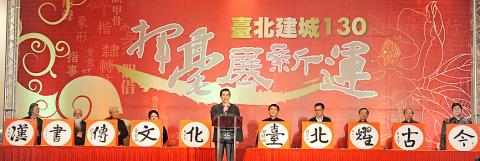President Ma Ying-jeou (馬英九) yesterday defended the cultural significance of traditional Chinese characters in a calligraphy activity, saying that there are no political implications behind the promotion of these characters.
Ma joined Taipei Mayor Hau Lung-bin (郝龍斌) and calligraphy masters to write down Chinese characters by creating calligraphy to welcome the new year, while insisting that the government would not promote simplified Chinese characters because of the increasing number of Chinese tourists.
“Traditional Chinese characters carry both cultural significance and artistic values and promoting these characters has nothing to do with any political stance. It’s very important for us not to sacrifice the characters for tourism,” he said during the ceremony at the Grand Hotel in Taipei.

Photo: Liu Hsin-de, Taipei Times
Ma, who helped establish the festival nine years ago during his term as Taipei mayor, said even though the number of Chinese tourists in Taiwan has reached about 3 million a year, they should have no problem reading traditional Chinese characters.
The Taipei City Government’s Department of Cultural Affairs also invited more than 100 calligraphy masters, as well as 20 foreign students and immigrants from countries including the US, Japan, South Korea, Vietnam and India, to write down their new year wishes using Chinese calligraphy.
Fifteen-year-old Neha Purswaney from India wrote the Chinese character for love (愛) on a piece of red paper. A student at Taipei American School, Purswaney said she is interested in traditional Chinese characters because they are special and beautiful.
“[I wrote down the character for love] because Taiwan is a country filled with love, and I hope that Taiwan will continue to be a loving country,” she said.

CAUTION: Based on intelligence from the nation’s security agencies, MOFA has cautioned Taiwanese travelers about heightened safety risks in China-friendly countries The Ministry of Foreign Affairs (MOFA) yesterday urged Taiwanese to be aware of their safety when traveling abroad, especially in countries that are friendly to China. China in June last year issued 22 guidelines that allow its courts to try in absentia and sentence to death so-called “diehard” Taiwanese independence activists, even though Chinese courts have no jurisdiction in Taiwan. Late last month, a senior Chinese official gave closed-door instructions to state security units to implement the guidelines in countries friendly to China, a government memo and a senior Taiwan security official said, based on information gathered by Taiwan’s intelligence agency. The

The National Immigration Agency (NIA) said yesterday that it will revoke the dependent-based residence permit of a Chinese social media influencer who reportedly “openly advocated for [China’s] unification through military force” with Taiwan. The Chinese national, identified by her surname Liu (劉), will have her residence permit revoked in accordance with Article 14 of the “Measures for the permission of family- based residence, long-term residence and settlement of people from the Mainland Area in the Taiwan Area,” the NIA said in a news release. The agency explained it received reports that Liu made “unifying Taiwan through military force” statements on her online

Taiwan Semiconductor Manufacturing Co (TSMC), the world’s largest contract chipmaker, said yesterday that it is looking to hire 8,000 people this year, at a time when the tech giant is expanding production capacity to maintain its lead over competitors. To attract talent, TSMC would launch a large-scale recruitment campaign on campuses across Taiwan, where a newly recruited engineer with a master’s degree could expect to receive an average salary of NT$2.2 million (US$60,912), which is much higher than the 2023 national average of NT$709,000 for those in the same category, according to government statistics. TSMC, which accounted for more than 60 percent

Tung Tzu-hsien (童子賢), a Taiwanese businessman and deputy convener of the nation’s National Climate Change Committee, said yesterday that “electrical power is national power” and nuclear energy is “very important to Taiwan.” Tung made the remarks, suggesting that his views do not align with the country’s current official policy of phasing out nuclear energy, at a forum organized by the Taiwan People’s Party titled “Challenges and Prospects of Taiwan’s AI Industry and Energy Policy.” “Taiwan is currently pursuing industries with high added- value and is developing vigorously, and this all requires electricity,” said the chairman